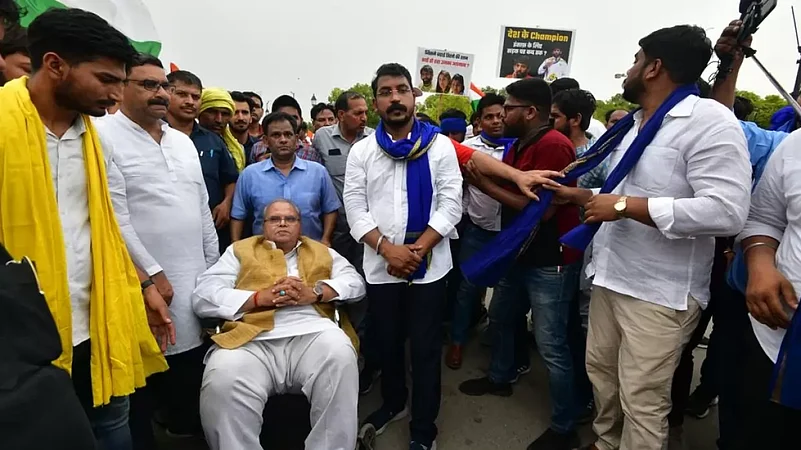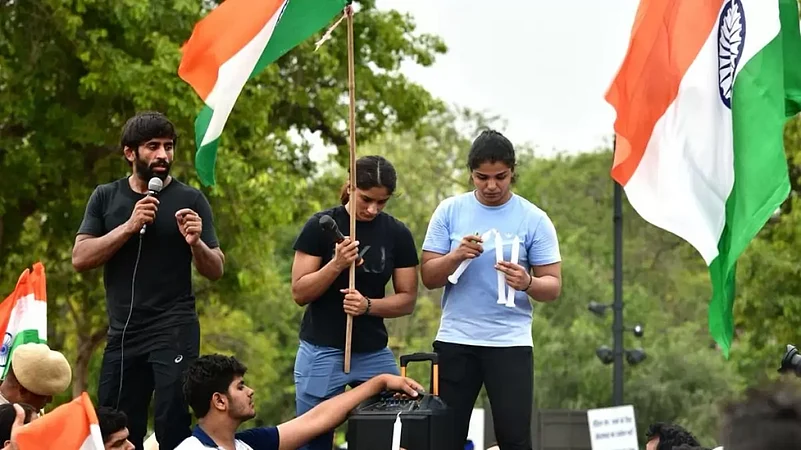“Under this flag, we won medals, under this flag we will protest…” Bajrang Punia addresses a massive crowd of protestors assembled at India Gate on Tuesday evening while Sakshi Malik and Vinesh Phogat wave the tricolour from atop a platform. Over a thousand people, holding the national flag in hand, had marched from Delhi’s Jantar Mantar amid a strong police presence along the marching route, and lit candles at India Gate to commemorate the completion of a month of their fight against Brij Bhushan Singh. Singh, the president of the Wrestlers Federation of India (WFI), is currently facing allegations of having sexually harassed young female wrestlers on multiple occasions under different pretexts.
People associated with the Bharatiya Kisan Union (BKU), Samyukt Kisan Morcha (SKM), All India Mahila Congress, Bhim Army, All India Students Associations, and many student organisations walked in the blistering heat demanding justice and arrest of Singh. Amid the milieu of protesters holding candles sits former Jammu and Kashmir governor Satya Pal Malik, who has been in a recent conflict with the government over the Pulwama row.

Since 23 April, some of the country’s top athletes including Olympian Bajrang Punia, Sakshi Malik, international medalist Vinesh Phogat, national wrestling star Sangeeta Phogat, youth Olympian Satyawart Kadian, and two-time national gold medalist Somvir Rathee have resolutely occupied space at Jantar Mantar to protest against Singh who is also a six-time BJP MP from Kaiserganj, Uttar Pradesh. While two FIRs have been registered against the BJP politician, who was appointed the WFI chief in 2012, no notice has been served to him to date.
Most of the wrestlers come from Haryana and Punjab, hence the candlelight march saw an influx of people from the northern agricultural states. “I believe there is a larger politics behind it. The ruling party at the Centre is deliberately not taking action because the protesting wrestlers are the daughters of Haryana. They want to push them to the backseat to give visibility to athletes from Uttar Pradesh, where Bhushan stands as an MP,” says Meenakshi Jain from the Bhim Army Mahila Morcha. She points out that perhaps this is the reason why the administration has jumped to casteist discrimination of ‘Jatt ki beti’ (Daughters of Jats) to blame the politics of the protest.
The message of the candlelight march was ‘naari sammaan’ (respect for women). The ongoing protest by female wrestlers, which began in January, this year, once again sheds light on the injustice meted out towards incidents of gender violence in the country. “In this country, gender justice is the least prioritised. It comes last and it should not be shocking yet, it is. If today, top Olympians have to take to the streets for this long to demand justice, imagine what happens to those from the rural areas. Young women are denied their rights and access to justice every day,” says Mandira Sarma, a member of the Teacher’s Association at Jawaharlal Nehru University (JNUTA).
Sarma, who has been visiting the protest site along with her colleagues from JNU, notes how justice towards women is neither certain nor speedy, but denied almost on a daily basis.

Accompanying Sarma is her colleague and professor, Urmi Mala, who says, “The plight of the Olympians brings to the front the plight of women in the Indian workforce across the nation. You see how women are made to feel helpless and sorry for their state for no fault of their own. And adding onto this is the complex politics of the country.”
The women at the protest site point fingers at the perpetrators of violence against women who enjoy impunity. The ones who are responsible for implementing the law are never held accountable for their actions and inactions. The top brass of the administration continues to remain silent.
On the 19th day of the protest, the wrestlers observed a ‘Black Day’ to register their anger against the government’s inaction against Singh. Women’s groups, members of Kisaan Andolan and the CPI joined the wrestlers' sporting black bands around their heads, arms and wrists.

Speaking to Outlook on Black Day, wrestler Vinesh Phogat says that the symbolism of the gesture was to express their anger at the systematic ignorance of their demands and failure in taking any action against Singh. “Everyone has known about Bhushan and his black deeds since his appointment, there is a lot of opposition to it. However, nobody wants to come forward and say anything fearing the power he holds,” she said. When asked if the protesters were hopeful about any positive outcome from their protest, a determined Phogat adds, “We have faith in this country. Whatever happens, will go down in history. What happened or happens to the daughters of this country shall be known.”
A former journalist at the candlelight march who wishes to remain unnamed and is less optimistic, says, “He (Singh) is the Bahubali (strongman); getting him into the fold of the law under the BJP regime would not be easy,”. Mired in legal technicalities and the country’s politics, it looks like this historic protest will go on for a while.
















